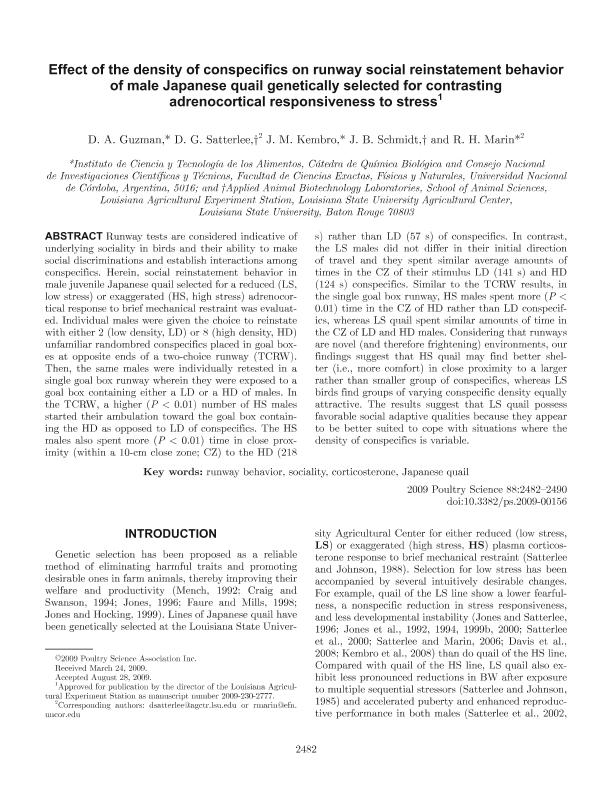Mostrar el registro sencillo del ítem
dc.contributor.author
Guzmán, Diego Alberto

dc.contributor.author
Satterlee, D. G.
dc.contributor.author
Kembro, Jackelyn Melissa

dc.contributor.author
Schmidt, J. B.
dc.contributor.author
Marin, Raul Hector

dc.date.available
2018-09-07T20:01:35Z
dc.date.issued
2009-12-01
dc.identifier.citation
Guzmán, Diego Alberto; Satterlee, D. G.; Kembro, Jackelyn Melissa; Schmidt, J. B.; Marin, Raul Hector; Effect of the density of conspecifics on runway social reinstatement behavior of male Japanese quail genetically selected for contrasting adrenocortical responsiveness to stress; Oxford University Press; Poultry Science; 88; 12; 1-12-2009; 2482-2490
dc.identifier.issn
0032-5791
dc.identifier.uri
http://hdl.handle.net/11336/58840
dc.description.abstract
Runway tests are considered indicative of underlying sociality in birds and their ability to make social discriminations and establish interactions among conspecifics. Herein, social reinstatement behavior in male juvenile Japanese quail selected for a reduced (LS, low stress) or exaggerated (HS, high stress) adrenocortical response to brief mechanical restraint was evaluated. Individual males were given the choice to reinstate with either 2 (low density, LD) or 8 (high density, HD) unfamiliar randombred conspecifics placed in goal boxes at opposite ends of a two-choice runway (TCRW). Then, the same males were individually retested in a single goal box runway wherein they were exposed to a goal box containing either a LD or a HD of males. In the TCRW, a higher (P < 0.01) number of HS males started their ambulation toward the goal box containing the HD as opposed to LD of conspecifics. The HS males also spent more (P < 0.01) time in close proximity (within a 10-cm close zone; Cz) to the HD (218 s) rather than LD (57 s) of conspecifics. In contrast, the LS males did not differ in their initial direction of travel and they spent similar average amounts of times in the Cz of their stimulus LD (141 s) and HD (124 s) conspecifics. Similar to the TCRW results, in the single goal box runway, HS males spent more (P < 0.01) time in the Cz of HD rather than LD conspecifics, whereas LS quail spent similar amounts of time in the Cz of LD and HD males. Considering that runways are novel (and therefore frightening) environments, our findings suggest that HS quail may find better shelter (i.e., more comfort) in close proximity to a larger rather than smaller group of conspecifics, whereas LS birds find groups of varying conspecific density equally attractive. The results suggest that LS quail possess favorable social adaptive qualities because they appear to be better suited to cope with situations where the density of conspecifics is variable.
dc.format
application/pdf
dc.language.iso
eng
dc.publisher
Oxford University Press

dc.rights
info:eu-repo/semantics/openAccess
dc.rights.uri
https://creativecommons.org/licenses/by-nc-nd/2.5/ar/
dc.subject
Corticosterone
dc.subject
Japanese Quail
dc.subject
Runway Behavior
dc.subject
Sociality
dc.subject.classification
Otras Ciencias Biológicas

dc.subject.classification
Ciencias Biológicas

dc.subject.classification
CIENCIAS NATURALES Y EXACTAS

dc.title
Effect of the density of conspecifics on runway social reinstatement behavior of male Japanese quail genetically selected for contrasting adrenocortical responsiveness to stress
dc.type
info:eu-repo/semantics/article
dc.type
info:ar-repo/semantics/artículo
dc.type
info:eu-repo/semantics/publishedVersion
dc.date.updated
2018-07-23T17:29:53Z
dc.identifier.eissn
1525-3171
dc.journal.volume
88
dc.journal.number
12
dc.journal.pagination
2482-2490
dc.journal.pais
Reino Unido

dc.journal.ciudad
Oxford
dc.description.fil
Fil: Guzmán, Diego Alberto. Consejo Nacional de Investigaciones Científicas y Técnicas; Argentina. Universidad Nacional de Córdoba. Facultad de Ciencias Exactas Físicas y Naturales. Instituto de Ciencias y Tecnología de los Alimentos; Argentina
dc.description.fil
Fil: Satterlee, D. G.. State University of Louisiana; Estados Unidos
dc.description.fil
Fil: Kembro, Jackelyn Melissa. Universidad Nacional de Córdoba. Facultad de Ciencias Exactas Físicas y Naturales. Instituto de Ciencias y Tecnología de los Alimentos; Argentina. Consejo Nacional de Investigaciones Científicas y Técnicas; Argentina
dc.description.fil
Fil: Schmidt, J. B.. State University of Louisiana; Estados Unidos
dc.description.fil
Fil: Marin, Raul Hector. Consejo Nacional de Investigaciones Científicas y Técnicas; Argentina. Universidad Nacional de Córdoba. Facultad de Ciencias Exactas Físicas y Naturales. Instituto de Ciencias y Tecnología de los Alimentos; Argentina
dc.journal.title
Poultry Science

dc.relation.alternativeid
info:eu-repo/semantics/altIdentifier/url/https://academic.oup.com/ps/article/88/12/2482/1532649
dc.relation.alternativeid
info:eu-repo/semantics/altIdentifier/doi/http://dx.doi.org/doi:10.3382/ps.2009-00156
Archivos asociados
